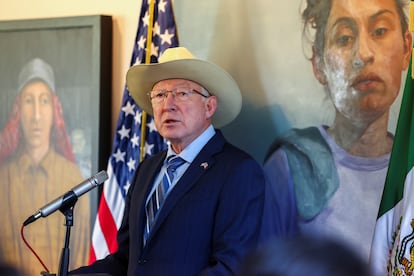‘Mexico is not safe’: Ken Salazar takes hardest stance yet on violence crisis
Weeks before leaving office, the U.S. ambassador accuses López Obrador of closing the door to collaboration with Washington

“Mexico is not safe.” “Republican austerity could worsen security.” “The ‘hugs, not bullets’ strategy did not work.” These were some of the pointed remarks delivered by Ken Salazar during his Wednesday press conference. As he approaches the end of his tenure, the U.S. ambassador to Mexico has chosen to voice his concerns openly, highlighting the violence crisis gripping Mexico and the security breakdowns that have strained bilateral relations in recent months.
Salazar’s comments marked Washington’s toughest stance yet, as he blamed Mexico’s former president Andrés Manuel López Obrador for “closing the doors” on collaborative efforts to fight organized crime. “The previous president did not want to receive help from the United States,” he said.
After the “diplomatic pause” initiated by López Obrador in September and being sidelined at the start of President Claudia Sheinbaum’s administration in October, Salazar is now outlining his final phase in office, which will end in November. While he did not specify an exact departure date, Donald Trump’s decisive victory in the U.S. presidential election signals the imminent arrival of a new ambassador. With little left to lose, Salazar announced that he will spend his remaining weeks assessing key aspects of the U.S.-Mexico relationship, such as migration and trade. This week, his focus was on violence. “Security is what’s most important, it is the linchpin of a democracy,” he said. “The people of Mexico should not live in fear.”
At the press conference, Salazar spoke of his differences with López Obrador six-year administration. He denied that the “diplomatic pause” stemmed from his criticism of Mexico’s judicial reform (under which judges will be elected by popular vote), explaining that tensions began over a year ago. Though he avoided naming a specific incident, he implied that the fallout over the capture of Ismael “El Mayo” Zambada — a move the Mexican government considered unilateral — was symptomatic of the loss of trust. “The Mexican government closed the doors, never the United States,” Salazar remarked.
Salazar attributed López Obrador’s refusal to collaborate with the U.S. to “ideological problems” and an approach that “fails to grasp the realities of insecurity” in Mexico. “I conveyed this clearly to the previous president,” he said, recalling their disagreements over security matters. He further criticized the former president for turning down U.S. assistance offered under the Bicentennial Understanding. “Millions of dollars were available to support Mexico’s security efforts, but they paused, stopped, and blocked it,” he lamented.
“When they just say ‘there is no problem, we have these statistics to show people there is no problem,’ that is not based on reality,” Salazar said. “There is a very big problem.”
The U.S. ambassador to Mexico argued that simply “blaming the United States” or turning to “explanations from the past” will not suffice to address the current crisis. He strongly criticized the government’s so-called “republican austerity” — López Obrador’s much-trumpeted preference for living simply and spending time with ordinary people —and underscored the need to bolster Sheinbaum’s new strategy with substantial resources to combat corruption within the police and judicial systems.
“Republican austerity will not achieve security in Mexico,” he said. Salazar warned there must be greater coordination with the U.S. and hinting that both Democrats and Republicans are losing patience. “Sheinbaum’s plan must succeed,” he said.
Salazar’s remarks sparked controversy in the Mexican government. Manuel Huerta from the ruling party Morena accused Salazar of being “interventionist” and attempting to “subordinate” Mexican authorities.
Reflecting on the Democratic Party’s loss in the U.S. election, Salazar admitted: “It must hurt, we lost the election. But losing the election does not mean that the relationship will end.” He spoke sparingly about the implications of Trump’s presidency for Mexico. Addressing the Republican’s campaign threats of tough policies, Salazar noted: “Much of what is said during the campaign” does not materialize when politicians assume office. When pressed on issues such as migration, arms trafficking cooperation, and Trump’s recent hardline appointments, he responded: “You will have to ask the president-elect and his team.”
The appointments of Marco Rubio as Secretary of State, Tom Homan as “border czar,” and Kristi Noem as Secretary of Homeland Security have raised concerns in Mexico that the Trump administration will implement stricter policies on its southern neighbor. “It will be crucial to look at the formation of his Cabinet and identify who will serve as Mexico’s interlocutors,” predicted Pía Taracena, an academic at Universidad Iberoamericana, last week. “This new era will not be easy for Mexico.”
As his departure looms, Salazar announced plans to visit northern and southeastern Mexico before concluding his term, and took time to speak with reporters in the ambassador residence’s garden. Several formalities, announcements, and protocol matters remain before his tenure officially ends. Trump has yet to name his ambassador, who must be confirmed by the Senate. Beyond specific appointments, all signs point to an end to Washington’s era of “strategic tolerance” with its Mexican partners. Trump is set to take office on January 20.
Sign up for our weekly newsletter to get more English-language news coverage from EL PAÍS USA Edition
Tu suscripción se está usando en otro dispositivo
¿Quieres añadir otro usuario a tu suscripción?
Si continúas leyendo en este dispositivo, no se podrá leer en el otro.
FlechaTu suscripción se está usando en otro dispositivo y solo puedes acceder a EL PAÍS desde un dispositivo a la vez.
Si quieres compartir tu cuenta, cambia tu suscripción a la modalidad Premium, así podrás añadir otro usuario. Cada uno accederá con su propia cuenta de email, lo que os permitirá personalizar vuestra experiencia en EL PAÍS.
¿Tienes una suscripción de empresa? Accede aquí para contratar más cuentas.
En el caso de no saber quién está usando tu cuenta, te recomendamos cambiar tu contraseña aquí.
Si decides continuar compartiendo tu cuenta, este mensaje se mostrará en tu dispositivo y en el de la otra persona que está usando tu cuenta de forma indefinida, afectando a tu experiencia de lectura. Puedes consultar aquí los términos y condiciones de la suscripción digital.









































